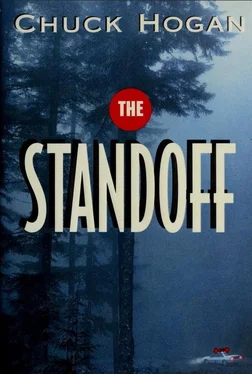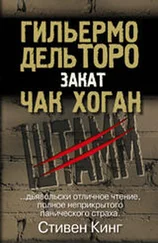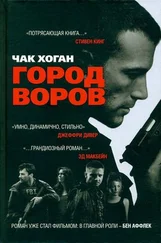Banish said, “Dr. Reed, I really do have to go.”
“But I can tell by your voice, John, you are strong now. You must be to have been assigned this case. I am so encouraged by your progress. You have overcome more than anyone will ever know, John. It is a triumph, and I do hope you understand that. To have come as far as you have. You have much to be proud of.”
She went on saying a few more things like that, then they said their goodbyes and hung up. Banish remained sitting there awhile looking at the phone.
Perkins was there now too. There were four of them: Perkins, Banish, the sound man, and Blood himself. The inside of the van smelled faintly like their chicken-and-gravy dinner, a picked-at plate of which sat on the control panel near Banish.
It was getting late in the day, and this fact was well known and weighed heavily upon all concerned. Banish was sitting back from the desk panel. He was brooding. “Let me hear it again,” he said.
The sound man worked the buttons and the distant, eavesdropped conversation was replayed once again.
Ables’s voice saying, “Esther. Get back here.”
A young girl’s voice, more distant. “Mommy in back room.”
Ables’s voice again, sharper, “Becca, get her back here.”
Then footsteps and off. Banish sat there thinking.
Blood said, “Which one is Esther again?”
Perkins told him, “The five-year-old.”
The sound man was puzzled. “In the back room,” he said. “Must be her post.”
“Watson.”
The voice surprised them, but most of all Perkins, who wasn’t used to being jump-started by it. He stepped up behind Banish as though they were about to meet Ables in person. Banish moved forward to his microphone. “Go ahead, Mr. Ables,” he said.
Ables said, “One: The house will be put in my wife’s name. She will not be arrested, and neither will Shelley or my kids.”
Banish sat up straighter. Perkins brought out a small notebook and pen and started scribbling. “That can be arranged,” Banish said measuredly. “Go ahead.”
“Two: I will walk off my land a free man. I will walk out of my house and down to the bottom of the mountain. TV cameras will be set up to film my arrest.”
Banish said, “That is fine, Mr. Ables. The only problem I can foresee is the location—”
“These are demands, Watson,” Ables said. “Three: I will not be placed in any handcuffs whatsoever.”
Banish sat and listened. It was obviously a snag. Perkins scribbled next to him.
“Four: I will read a speech on television at the time of my arrest. Five: The federal government will publicly admit its conspiracy and guilt in the premeditated murder of Judith Ann Ables.”
The pause told them Ables was through. Banish frowned. “No deal,” he said into the handset.
Ables said, “I didn’t offer you a deal, Watson. These are my demands.”
Banish took the list from Perkins and quickly reviewed it. “One,” he said. “Any statements you wish to make, political or otherwise, may be released through your lawyer at an appropriate time following your arrest. Two: Arresting you at the bridge could incite a riot and may risk the safety of my men; I won’t do that. Three: I am not, nor is anyone here, authorized to speak on behalf of the federal government of the United States of America.”
A loud click and clatter as the phone was slammed down on Ables’s end. Quiet for a moment, then “Sons of bitches!” heard, then booted footsteps walking away.
Banish switched off his microphone and turned around in his chair. He looked drawn and tired but, to Blood’s surprise, not disappointed. In fact, he looked pleased.
Perkins said, “The Ritual?”
Banish nodded. “He’s started to fold.”
Blood interrupted. “What is “The Ritual’?”
Perkins turned toward him like a man finding a dollar bill on the floor. “Surrender Ritual,” he said. “The suspect preparing to leave. Emptying his pockets, giving things away. Winding down.” He looked quickly at Banish, who was looking at the van floor, and then back again at Blood. “A mixed-up process they go through before giving up.”
“Like making out a will before a long trip,” Banish said, standing suddenly and moving away. “We’ve got him.”
The principals convened inside the marshals tent for a midmorning strategy meeting over breakfast. Perkins had organized the conference and figured to be instrumental in the post resolution breakdown of the staging area. He was seated, spooning out the loose white of a salted soft-boiled egg, between his ASAC, Hardy, and a tieless representative of the American Red Cross. Also seated there were SAs Banish and Coyle, two HRT agents, Fagin and another deputy marshal, two U.S. Attorneys from Helena with whom Perkins was acquainted, a GS-5 stenographer, and the local sheriff. The mood around the table was one of optimism, of anticipating the end of a tough, drawn-out siege and the satisfaction of a job well done, except of course for Fagin, for whom no form of resolution short of a blitzkrieg would have been entirely satisfactory, and Banish, who appeared distracted. Perkins assumed it was because Ables had been silent overnight.
The surrender protocol was SOP and familiar to all involved. They were assembled to iron out the particulars so that the event would proceed smoothly, and to ensure that the arrest would be performed strictly by the book. All agreed that they had come too far to risk being shot in the foot by a technicality.
Following Ables’s arrest, the task of removing him safely off-site fell to HRT. They had already secured the services of a UH-60 Black Hawk military helicopter, to be captained by a member of the 160th Special Operations Aviation Regiment “Night Stalkers” unit, currently en route from its home base at Fort Campbell, Kentucky. Ables would be transferred under HRT guard to the U.S. District Court in Helena and held there pending arraignment.
A special medical helicopter would airlift Mrs. Ables to a hospital in Great Falls, where she would be treated and later interviewed along with Mrs. Mellis. The Ables children would be turned over to their maternal grandparents following a nutritious meal, routine physical and psychological examinations, and subsequent individual questioning. Banish spoke up for the first time at that juncture, reminding everyone once again that their primary concern was the safe rescue of the children.
Alert status would remain in effect until Ables was confirmed airborne. Following that, marshals and agents would move immediately up the mountain to secure the cabin and cordon off the surrounding area. An FBI forensics team would enter and complete a point-by-point situational analysis of the cabin and grounds, including on-site ballistics work and color photography for possible future trial exhibition. Weapons would be itemized and tagged, then removed to an outdoor table for press viewing. Perkins would deliver a brief media statement in front of the cabin detailing the harsh conditions inside, and end with a protocol of the various participating agencies. All inquiries would be referred to the Department of Justice.
Fagin, sitting next to the younger marshal taking notes, objected then. “We need a contingency plan,” he said. “We need a net in case things go sour up there.”
Perkins said, “Our current blanket operation is more than sufficient. We have total containment.”
“If the exchange goes bad,” Fagin argued, “there’s gonna be beaucoup confusion, and Ables could provoke events beyond our control. What do you think he’s doing up there now? He’s been quiet almost twelve hours. You think they’re playing cards?”
Читать дальше











